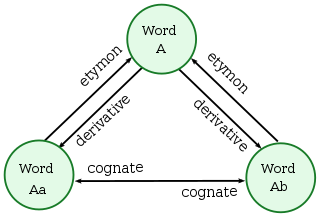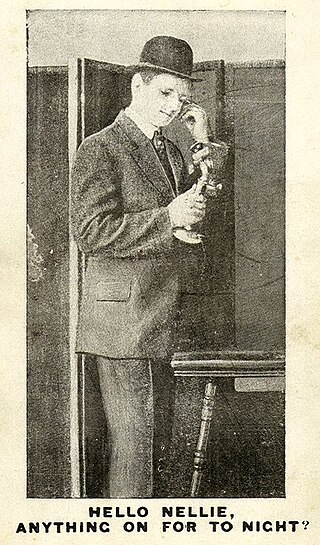Related Research Articles
In chemistry, an alkali is a basic, ionic salt of an alkali metal or an alkaline earth metal. An alkali can also be defined as a base that dissolves in water. A solution of a soluble base has a pH greater than 7.0. The adjective alkaline, and less often, alkalescent, is commonly used in English as a synonym for basic, especially for bases soluble in water. This broad use of the term is likely to have come about because alkalis were the first bases known to obey the Arrhenius definition of a base, and they are still among the most common bases.

In historical linguistics, cognates or lexical cognates are sets of words that have been inherited in direct descent from an etymological ancestor in a common parent language. Because language change can have radical effects on both the sound and the meaning of a word, cognates may not be obvious, and often it takes rigorous study of historical sources and the application of the comparative method to establish whether lexemes are cognate. Cognates are distinguished from loanwords, where a word has been borrowed from another language.

A definition is a statement of the meaning of a term. Definitions can be classified into two large categories: intensional definitions, and extensional definitions. Another important category of definitions is the class of ostensive definitions, which convey the meaning of a term by pointing out examples. A term may have many different senses and multiple meanings, and thus require multiple definitions.
Y, or y, is the twenty-fifth and penultimate letter of the Latin alphabet, used in the modern English alphabet, the alphabets of other western European languages and others worldwide. According to some authorities, it is the sixth vowel letter of the English alphabet. In the English writing system, it mostly represents a vowel and seldom a consonant, and in other orthographies it may represent a vowel or a consonant. Its name in English is wye, plural wyes.

A tramp is a long-term homeless person who travels from place to place as a vagrant, traditionally walking all year round.

A hobo is a migrant worker in the United States. Hoboes, tramps, and bums are generally regarded as related, but distinct: a hobo travels and is willing to work; a tramp travels, but avoids work if possible; a bum neither travels nor works.
The acute accent, ◌́, is a diacritic used in many modern written languages with alphabets based on the Latin, Cyrillic, and Greek scripts. For the most commonly encountered uses of the accent in the Latin and Greek alphabets, precomposed characters are available.
A fortnight is a unit of time equal to 14 days. The word derives from the Old English term fēowertīene niht, meaning "fourteen nights".
This is a list of British words not widely used in the United States. In Malaysia, Singapore, Hong Kong, Ireland, Canada, New Zealand, India, South Africa, and Australia, some of the British terms listed are used, although another usage is often preferred.
A contronym, contranym or autantonym is a word with two meanings that are opposite each other. For example, the word cleave can mean "to cut apart" or "to bind together". This phenomenon is called enantiosemy, enantionymy, antilogy or autantonymy. An enantiosemic term is by definition polysemic.

Josh Billings was the pen name of 19th-century American humorist Henry Wheeler Shaw. He was a famous humor writer and lecturer in the United States during the latter half of the 19th century. He is often compared to Mark Twain.

William Henry Davies was a Welsh poet and writer, who spent much of his life as a tramp or hobo in the United Kingdom and the United States, yet became one of the most popular poets of his time. His themes included observations on life's hardships, the ways the human condition is reflected in nature, his tramping adventures and the characters he met. His work has been classed to as Georgian, though it is not typical of that class of work in theme or style.
The term bagman has different meanings in different countries.

The Autobiography of a Super-Tramp is an autobiography published in 1908 by the Welsh poet and writer W. H. Davies (1871–1940). A large part of the book's subject matter describes the way of life of the tramp in the United Kingdom, Canada and the United States in the final decade of the 19th century.

A staycation, or holistay, is a period in which an individual or family stays home and participates in leisure activities within day trip distance of their home and does not require overnight accommodation. In British English, the term has increasingly come to refer to domestic tourism: taking a holiday in one's own country as opposed to traveling abroad.

Hello is a salutation or greeting in the English language. It is first attested in writing from 1826.

Hygge is a word in Danish and Norwegian that describes a cosy, contented mood evoked by comfort and conviviality. As a cultural category with its sets of associated practices hygge has more or less the same meaning in both places and in both languages; however, the emphasis on hygge as a core part of Danish culture is a recent phenomenon, dating to the late 20th century. In the 21st century, the concept has also been familiarized abroad.
References
- ↑ "Definition of boodle | Dictionary.com". www.dictionary.com.
- ↑ "Definition of BOODLE". www.merriam-webster.com.
- ↑ Partridge, E. (1968), A Dictionary of the Underworld: British and American, George Allen & Unwin, p.62
- ↑ Hockey, L. (1971), W. H. Davies, University of Wales Press (on behalf of the Welsh Arts Council), p.16